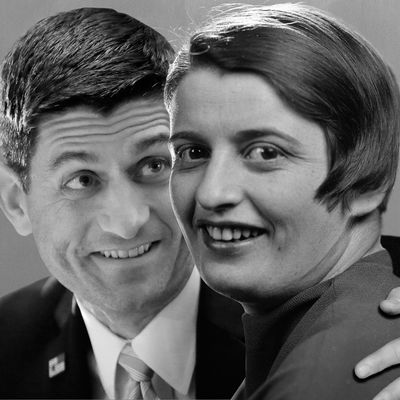
Is Paul Ryan an earnest, fiscally responsible wonk looking to make government more efficient, or an Ayn Rand–influenced ideologue determined to stop government from taking rich people’s money? This has been a long-standing debate between people like me and Ryan’s admirers in the political press corps. It is also a question of long-standing debate with Ryan defenders on the center-right like Ross Douthat, who once again defends his faith in Ryan’s hidden, subtextual, implied, or yet to fully emerge pragmatic impulses. Since Douthat likewise takes another opportunity to eye-roll my more direct, text-based reading of Ryan’s ideology (“a Randian Ryan or an apocalyptic Ryan or any other interpretation of his record Chait prefers”), the time seems right to summarize the evidence for my case.
So, here are seven things Paul Ryan has done that suggest Ayn Rand has influenced him:
1. Spent the Bush years demanding larger, more regressive tax cuts than Bush himself was proposing, urging them to be less afraid of “class warfare.”
2. Spent the Obama years repeatedly proposing budgets that “would produce the largest redistribution of income from the bottom to the top in modern U.S. history.”
In other words, Ryan’s entire legislative career.
3. Listed Rand’s magnum opus, Atlas Shrugged, as one of the three books he most frequently rereads.
4. Told The Weekly Standard, “I give out ‘Atlas Shrugged’ as Christmas presents, and I make all my interns read it.”
5. Repeatedly divided American society into “makers” and “takers.”
6. Declared that Rand’s thinking is “sorely needed right now” because we are “living in an Ayn Rand novel” and that “Ayn Rand, more than anyone else, did a fantastic job of explaining the morality of capitalism, the morality of individualism, and this, to me, is what is [sic] matters most.”
7. Appeared at a gathering of Rand devotees and declared Rand’s philosophy was “the reason I got involved in public service,” that he makes it “required reading in my office for all my interns and my staff,” and that her philosophy continues to inspire “almost every fight we are involved in here, on Capitol Hill.”
My interpretation that Rand has strongly influenced Ryan’s economic philosophy seems fairly straightforward: He has repeatedly described Rand as the touchstone for his public philosophy, and Ryan’s career in elected office has in fact reflected this commitment by working to reduce redistribution both from the “makers” and to the “takers.”
What is the case on the other side? Douthat has dismissed Ryan’s repeated expressions of philosophical affinity — “Ryan has said kind words about Ayn Rand” — which is accurate in the sense that “Lenin once had kind words for Marx” accurately summarizes the Soviet revolutionary’s affinity for communist theory. Douthat likewise dismisses the Randist analysis of Ryan’s work by pointing not to his proposals themselves but to other clues that lie outside the text. His post emphasizes “the Ryan who matters” — not the one who has endorsed deep cuts to the top tax rate and massive cuts in spending for the poor and sick. Likewise, we shouldn’t judge Ryan literally on the content of his proposals because “my sense is that Ryan himself might accept some of the merits” of the critique. Also, the true Ryan, argues Douthat, can be seen in the “outline” of “forays” into as-yet-nonexistent proposals:
While there isn’t (yet) a Ryan blueprint specifically focused on safety-net reform, if you look at some of his post-2012 forays on the issue, you can see the outline (in this op-ed, for instance) of a more plausible approach, in which the focus is on reshaping anti-poverty programs rather than just slashing them to achieve unlikely spending targets.
… as opposed to the actual proposals that Ryan has authored, voted for, and repeatedly held up as America’s salvation.






























